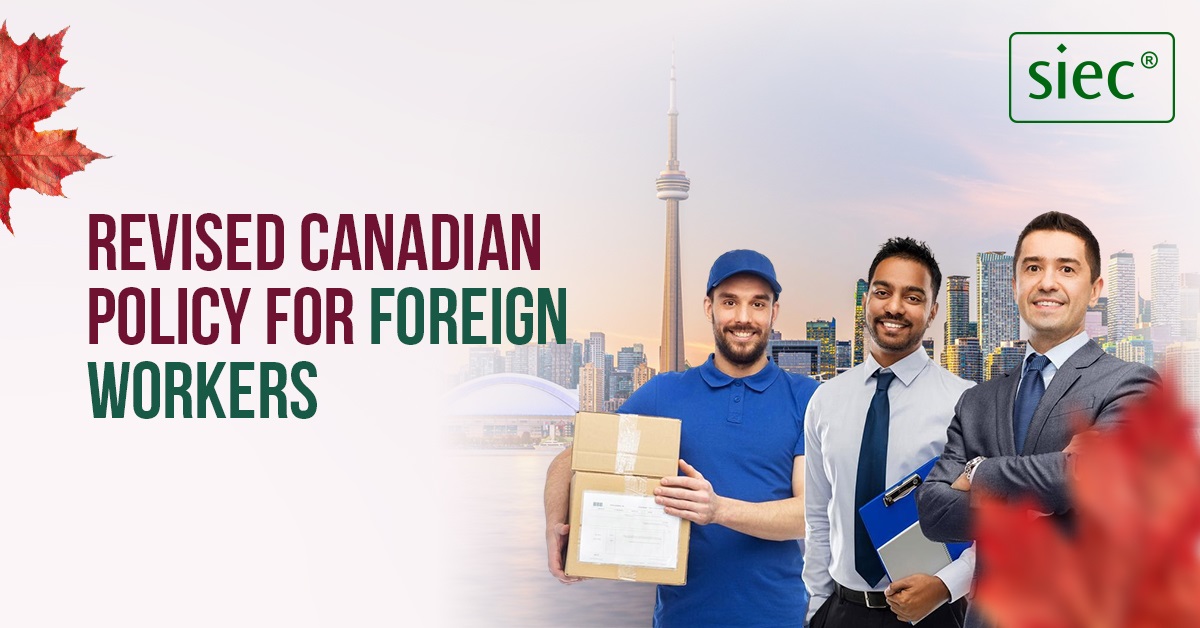
Updated On: 01 October 2025
Revised Canadian Policy for Foreign Workers
Canada is an attractive country for all skill sets roaming the world. But, as the year 2025 sets in, things will be taken a notch above. The newly amended Canadian policy for foreign workers is changing the old way of doing things by making it easier for an immigrant to work, change jobs, and even pass down citizenship. Whether you are an employer, a would-be immigrant, or simply a policy nerd, this update is for you.
Read More: The Future Impact of Rising H-1B Visa Fees
Why Canada Revised Its Foreign Worker Policy?
With an aging population and a declining birth rate, Canada needs foreign talent now more than ever. COVID-19 exposed severe labour gaps across industries-from healthcare, skilled trades, and tech, to food processing and agriculture. These Revised Canadian Policies are pushing for flexibility, integration, and growth.
Key Highlights of the Revised Policy (2025 Update)
1. Easier Job Transitions for Foreign Workers
Here comes the show steal-er-foreign workers no longer have to work for one employer having employment advantages under these new circumstances such as:
- Foreign workers would be able to change jobs with much ease without being away from legal status.
- These work permits should be open to any such person coming with the sector with high demands in skills.
- This increased independence prevents any exploitation by any employer.
2. Recognized Employer Pilot Expansion
Originally launched as a small initiative, the Recognized Employer Pilot is now nationwide. This means:
- Pre-approved employers don’t need to go through lengthy checks repeatedly.
- Sectors like construction, manufacturing, and agriculture benefit the most.
3. Longer Validity of Work Permits
Previously, many foreign workers had to renew permits annually. That’s a thing of the past:
- New work permits can now be issued for up to three years.
- Stability helps workers plan their lives and contributes to long-term retention.
4. Temporary Foreign Worker Program (TFWP) Modifications
The TFWP has seen one of its biggest updates in a decade:
- LMIA (Labour Market Impact Assessment) is now digitized and simplified.
- Canada is prioritizing roles that are essential or in short supply.
See Also: UK Student Visa Surge in 2025: What International Students Need to Know
New Policy Changes Canada
Canadians Can Now Pass on Citizenship to Kids Born Abroad
In a surprising and historic move, the government now allows Canadian citizens to pass on citizenship to their children born abroad, even if the parent was born outside Canada. This fixes a longstanding issue and ensures family unity and stronger immigrant integration.
Provincial Nominee Program (PNP) Sync with New Rules
PNP is now faster and smarter:
- Application timelines have reduced significantly.
- Provinces can now align nominations with federal work permit policies.
So if you’ve got a job offer in Alberta or Ontario, your PR dream just got closer.
Eased Work Permit Conditions for International Students
International graduates rejoice! New updates mean:
- More relaxed post-graduation work permit rules
- No job offer required to apply for open permits
- Clearer path to permanent residency
You might also like: US: Is Trump administration actions creating an uncertain outlook for international students?
How This Affects Employers in Canada?
Hiring foreign workers used to be a paperwork nightmare. Now?
- Employers enjoy a streamlined application process
- Recognized status means fewer delays and more predictability
- This change encourages small and mid-sized businesses to tap into global talent.
Impact on Foreign Workers
Let’s not sugarcoat it—being a foreign worker can be hard. But these new rules flip the narrative:
- Workers now have greater mobility, fewer restrictions, and stronger rights
- This leads to better work-life balance and long-term retention
Economic Benefits for Canada
This isn’t just about immigration. It’s about economics.
- More foreign workers mean more tax revenue, innovation, and growth
- Employers get to fill roles that locals can’t or won’t take
- Canada becomes a top destination for global talent
Who Qualifies Under the New Policy Canada?
Eligibility is broad but strategic:
- Skilled workers with LMIA-exempt or recognized employer status
- International students and recent grads
- Spouses of primary applicants under specific NOC categories
- Check the government portal or consult a registered immigration consultant for tailored guidance.
See this also: Geopolitics Can Enhance Your Study Abroad Experience
What Foreign Workers Should Do Now?
Don’t wait. Take action:
- Update your work permit status
- If eligible, apply for open permits
- Look out for the Recognized Employer List
- Explore PR pathways
Challenges to Keep in Mind
Every policy has its hurdles:
- Implementation may vary by province
- Scammers may take advantage of the changes
- Ensure you get information from trusted sources only
Canada vs. Other Countries: Who’s Winning the Talent War?
Compared to Australia, the U.S., or the UK:
- Canada offers quicker routes to PR
- Easier job switching
- Friendlier policies for families and students
- Simply put—Canada’s playing to win
You may like: A Story of Learning and Growth from India to Australia
Conclusion
The 2025 revision of Canada’s foreign worker policy isn’t just a legal update—it’s a signal to the world. A signal that says: “If you have the talent, we have the opportunity.” From easier job transitions to extending citizenship rights, this move places Canada miles ahead in the global race for talent.
FAQs
Q1. Can foreign workers now freely change jobs in Canada?
Yes, with open work permits becoming more common, foreign workers have greater freedom to switch employers without jeopardizing their status.
Q2. What is the Recognized Employer Pilot in Canada?
It’s a program that allows trusted employers to fast-track hiring without repeated bureaucratic checks, especially in high-demand sectors.
Q3. How has the LMIA process changed?
The LMIA process is now faster, simplified, and digital, focusing on key sectors like healthcare, manufacturing, and tech.
Q4. Can Canadians pass citizenship to kids born abroad?
Yes! As of 2025, Canadian citizens—even those born outside Canada—can pass citizenship to their children born overseas.
Q5. Are international students benefiting from these changes?
Absolutely. Post-graduation work permit rules are relaxed, making it easier for them to stay, work, and apply for permanent residency.
Conclusion
Reach out to SIEC for Application inquiries and assistance.
Read more insightful articles:
European Universities lead in affordable education and career growth
QS World University Rankings: Sustainability 2025 Revealed
What career paths are open to international students in France?


Comments (0)
Leave a Comment